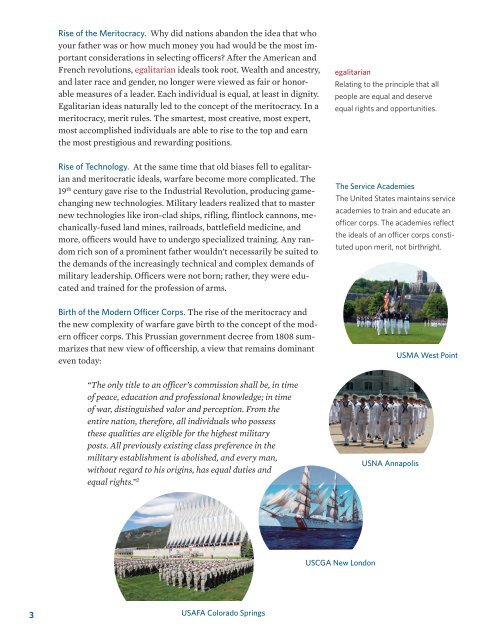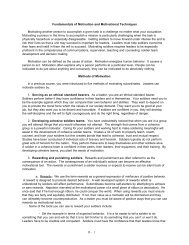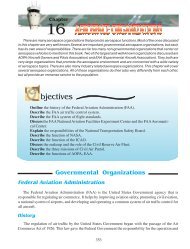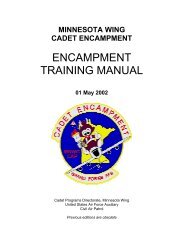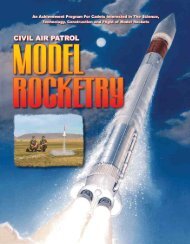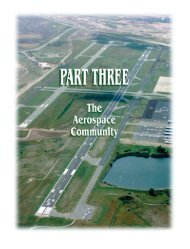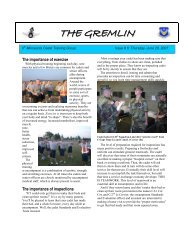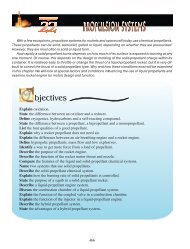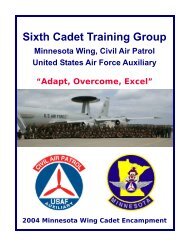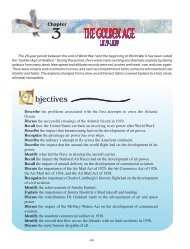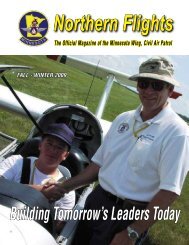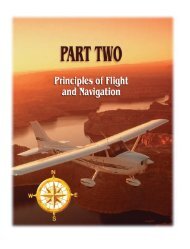Layout 1 - Civil Air Patrol
Layout 1 - Civil Air Patrol
Layout 1 - Civil Air Patrol
Create successful ePaper yourself
Turn your PDF publications into a flip-book with our unique Google optimized e-Paper software.
04-Chapter 9 Reboot Attempt PP 3-4_<strong>Layout</strong> 1 5/4/12 12:29 Page 3<br />
Rise of the Meritocracy. Why did nations abandon the idea that who<br />
your father was or how much money you had would be the most important<br />
considerations in selecting officers After the American and<br />
French revolutions, egalitarian ideals took root. Wealth and ancestry,<br />
and later race and gender, no longer were viewed as fair or honorable<br />
measures of a leader. Each individual is equal, at least in dignity.<br />
Egalitarian ideas naturally led to the concept of the meritocracy. In a<br />
meritocracy, merit rules. The smartest, most creative, most expert,<br />
most accomplished individuals are able to rise to the top and earn<br />
the most prestigious and rewarding positions.<br />
egalitarian<br />
Relating to the principle that all<br />
people are equal and deserve<br />
equal rights and opportunities.<br />
Rise of Technology. At the same time that old biases fell to egalitarian<br />
and meritocratic ideals, warfare become more complicated. The<br />
19 th century gave rise to the Industrial Revolution, producing gamechanging<br />
new technologies. Military leaders realized that to master<br />
new technologies like iron-clad ships, rifling, flintlock cannons, mechanically-fused<br />
land mines, railroads, battlefield medicine, and<br />
more, officers would have to undergo specialized training. Any random<br />
rich son of a prominent father wouldn’t necessarily be suited to<br />
the demands of the increasingly technical and complex demands of<br />
military leadership. Officers were not born; rather, they were educated<br />
and trained for the profession of arms.<br />
The Service Academies<br />
The United States maintains service<br />
academies to train and educate an<br />
officer corps. The academies reflect<br />
the ideals of an officer corps constituted<br />
upon merit, not birthright.<br />
Birth of the Modern Officer Corps. The rise of the meritocracy and<br />
the new complexity of warfare gave birth to the concept of the modern<br />
officer corps. This Prussian government decree from 1808 summarizes<br />
that new view of officership, a view that remains dominant<br />
even today:<br />
USMA West Point<br />
“The only title to an officer’s commission shall be, in time<br />
of peace, education and professional knowledge; in time<br />
of war, distinguished valor and perception. From the<br />
entire nation, therefore, all individuals who possess<br />
these qualities are eligible for the highest military<br />
posts. All previously existing class preference in the<br />
military establishment is abolished, and every man,<br />
without regard to his origins, has equal duties and<br />
equal rights.” 2<br />
USNA Annapolis<br />
USCGA New London<br />
3<br />
USAFA Colorado Springs


